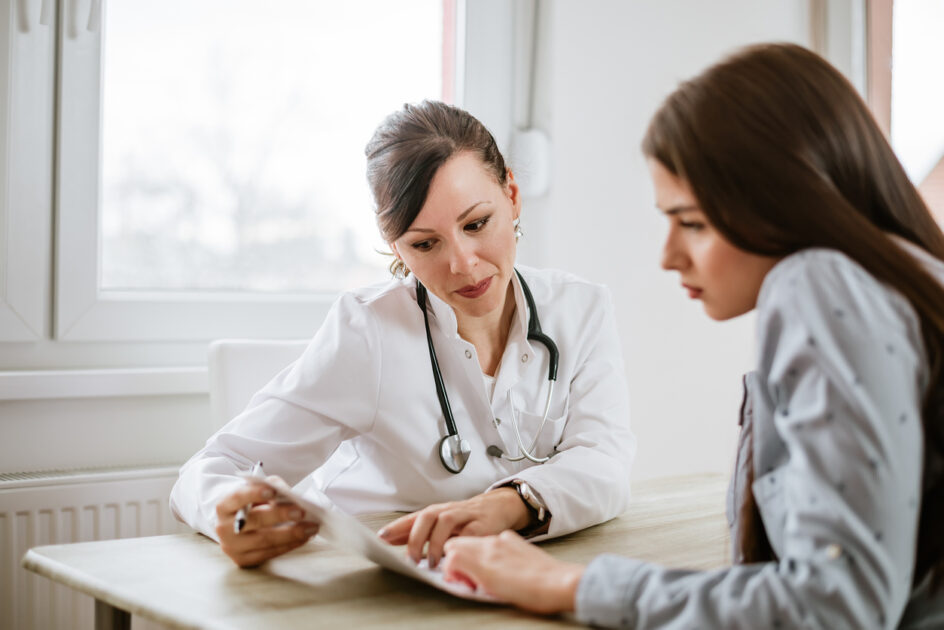Talking to your GP about your mental health
Guidance on talking to your GP, from registering with your local practice to preparing for your first appointment.

Your GP will usually be your first contact if you have any concerns about your physical or mental health. You may be feeling low, noticing that you’re often anxious, or suspecting that something is wrong but aren’t sure what. If you feel the need for professional support, you may have concerns or worries about talking to your GP about your mental health. Whatever your mental health concerns, speaking to your GP is a good first step to take because they know what mental health supports are available to you and they have the power to give you a referral to those supports.
Learn about your rights to mental health treatment as a young person.
In this article, you will find detailed information on how to approach talking to your GP about your mental health. We provide answers to the following questions:
How do I find a GP near me?
How do I book an appointment with my GP?
What should I tell my GP?
What can I expect from my GP?
How do I prepare before my appointment?
Will I be prescribed medication?
How much does a GP cost?
Talking to your GP about your mental health
Before learning more about how to talk to your GP, it can be helpful to understand what their role involves. A general practitioner (GP) is a family doctor who is trained to provide care to people experiencing non-emergency health issues in the community. In general, groups of GPs work in GP surgeries or clinics throughout the country.
GPs offer a range of services to their patients, including routine check-ups, treatment for physical health complaints (e.g., viral and bacterial infections), and prescriptions for medications. In addition to treating physical health issues, GPs can also assess and treat a range of mental health difficulties. In some cases, when a patient has moderate to severe mental health challenges, they may refer them to a specialist for more tailored care.
Finding a GP near you
To get medical care from a GP, you need to be registered with a GP clinic. You may already be registered with a GP if you were born in Ireland or have been resident in the country for a long time. If you are unsure whether or not you’re already registered with a GP surgery, check with a parent or guardian.
If you are certain that you’ve not been previously registered with a GP surgery, you can find one near you by searching on the HSE website. Once you have a list of clinics, call them using the contact number on their website to check if they’re accepting new patients. Some clinics might be at full capacity and unable to take on new patients, so you may need to contact another clinic.
Keep in mind that if you have a medical card, you can see your GP for free. If you don’t have a medical card, you’ll need to pay for your GP visits. Check if the clinic you’re interested in accepts public patients with a medical card, as some only see private patients.
If you’re a university student, you might also be able to visit a GP at your campus health centre.
Read more about how to obtain a medical card if you think you may be entitled to one. Keep in mind that young people aged 16-25 who are dependent on a parent or guardian may be entitled to a medical card if their parent or guardian has one.
How to book an appointment with a GP
Booking an appointment with your GP is straightforward. You can either call the surgery or visit in person to schedule a time with the receptionist. If you prefer, you can request a male or female doctor, provided there is one available.
When booking, you don’t need to explain the reason for your visit in detail. If asked, you can simply mention that it’s related to a mental health issue without going into specifics. However, if you are very distressed or feeling suicidal, make sure to emphasise that you need an urgent appointment.
If you are under the age of 18, you can ask a parent or guardian to make the appointment for you. Keep in mind, however, that young people between the ages of 16 and 18 require the consent of a parent or guardian to receive mental health treatment. Read more on your right to medical consent and confidentiality.
What if I need an out-of-hours GP appointment?
GP surgeries typically operate from 9 am to 5 pm. For urgent issues outside these hours or on weekends, contact a GP out-of-hours service. These services handle urgent, non-routine health concerns only.
When calling your local GP surgery after hours, a recorded message will usually give you the number for the nearest out-of-hours service. If you have trouble finding it, visit the HSE website for contact details of your nearest out-of-hours service.
Alternatively, visit your GP practice website to find the out-of-hours surgery connected to your own practice. The out-of-hours service connected to your regular practice usually sends details of the consultation to your own GP, unless you ask them not to. This helps your GP stay informed about any health issues and follow up if needed.
When you call the out-of-hours clinic, you’ll speak with a nurse who will ask questions to determine the urgency of your situation. The nurse will then consult with the on-call doctor and arrange an appointment for you that day if they determine that urgent care is needed. Bear in mind that dropping into an out-of-hours clinic without an appointment generally won’t result in being seen.
What to reveal when talking to your GP about your mental health
Talking to your GP about your mental health can be difficult, especially if you’re not used to sharing how you feel. You may choose to speak to the GP alone or request to have a parent or guardian or other trusted person present at the GP visit. If you are under the age of 18, your GP may be required to notify a parent or guardian about what you have discussed if they are concerned about risk.
Tips for getting the most out of your appointment:
- Make notes: Before your visit, write down any concerns or questions you have. It’s also helpful to take notes during the appointment so you don’t forget important details
- Ask questions: Don’t hesitate to ask questions or seek clarification if something isn’t clear. Your GP is there to help you understand what might be going on and to answer your questions
- Be honest: Share openly about what you’re experiencing, how long it’s been happening, and how it affects your daily life. This helps your GP recommend the most appropriate supports or treatments
- Share your health history: If asked, provide information about any previous mental health treatments, current or past medications, allergies, health conditions, and any family health issues. Preparing a brief summary beforehand can be useful. Try to be honest about any recreational drug use or alcohol consumption, as this can be related to the feelings you may be experiencing
- Discuss your recovery goals: Let your GP know what outcomes you’re hoping for, such as reducing symptoms or improving your ability to engage in daily activities. This can help in deciding the best approach to support your goals
- Understand next steps: If your GP suggests a treatment, like an antidepressant, ask about the benefits, risks, and what the treatment involves. Make sure you understand why it might be recommended and how it could help you
Telling your GP about self-harm
If you are opening up to your GP about self-harm, they may ask you questions about your self-harm, such as:
- How you self-harm
- Where on your body you self-harm
- When you started self-harming
- What triggers your urge to self-harm
Your GP may also want to see your injuries to assess whether they need medical attention. Read more about getting help for self-harm.
How to prepare before your GP appointment
GP appointments are usually brief (i.e., 15 mins or less), so it’s a good idea to prepare what you want to discuss in advance. Arriving on time can also help reduce stress and make it easier to communicate your concerns clearly. In most GP surgeries, you can request a double appointment if you feel you will need more time.
It can be helpful to write down your main points and bring your notes with you. You can also share your notes with your GP so they can read what you have written. If you find it hard to talk about what’s going on, consider bringing a friend or family member with you to the appointment. If they can’t attend, discuss your concerns with them beforehand. This can help you feel more confident when speaking to your GP.
What can you expect after talking to your GP about your mental health?
GPs sometimes use mental health screeners, which are short questionnaires, to help identify mental health issues like anxiety or depression. These screeners can guide the GP in deciding if further treatment or a referral to a specialist is needed. When talking to your GP about your mental health, your GP should treat you respectfully and non-judgmentally.
While a diagnosis might not be provided during your first visit, your GP could refer you to a specialist, if needed. They may also offer advice on how to improve your mental well-being, such as through exercise, healthy eating, or better sleep habits.
Before deciding on any treatment, make sure to ask about all treatment options and which treatment option might be best for you.
Here are some questions that can help you make informed decisions about your care and feel more confident in managing your health:
- Can you explain more about this condition and why you think I have it?
- What signs should I watch for?
- What are the different treatments available for this condition?
- What are the benefits of this treatment?
- What risks are associated with this treatment?
- What does the treatment involve?
- Why do I need this test, and what will it involve?
- What will the results of the test tell us?
- Why is this medication recommended, and are there any side effects?
- What can I do to improve my mental health?
- What community supports are available to help me manage these difficulties?
- Should I schedule a follow-up appointment, and if so, when?
Getting a referral
Moderate to severe mental health difficulties
If you’re experiencing mental health issues that are significantly impacting your daily life, your GP may refer you to a specialised mental health service:
- For those under 18: You might be referred to your local Child and Adolescent Mental Health Services (CAMHS), which supports young people up to age 18
- For those 18 and over: You may be referred to your local Adult Mental Health Services (AMHS)
Since waiting lists for CAMHS and AMHS can be long, ask your GP if there are any immediate steps you can take to help yourself in the meantime.
In some areas, Jigsaw offers youth mental health services for people aged 12 to 25. Your GP might suggest this option if it’s available near you. You can also access Jigsaw online and speak directly to a clinician regardless of whether there is a Jigsaw in your area. Other supports include mental health charities like Aware, helplines, and free, 24/7 messaging services such as Text About It.
You may also be referred to counselling or psychotherapy. This type of support involves talking with a qualified counsellor or psychotherapist about your worries and concerns over several one-to-one hour sessions. Your GP may be able to recommend free or low-cost counselling options in your area, such as MyMind, Turn2Me, and the National Counselling Service. If you have the means and do not want to be restricted to a set number of free sessions, you can also explore private counselling or psychotherapy.
Find out more about what happens when your GP refers you to CAMHS.
Mild mental health difficulties
If you’re experiencing mental distress that’s affecting your mood but not seriously impacting your daily tasks, your GP might refer you to the HSE’s primary care psychology service. Primary care psychologists provide a range of assessments and psychological treatments based on your individual needs.
People often seek help from psychologists for low mood and anxiety, or after they have experienced a stressful, traumatic, or challenging experience. Such experiences might include:
- Death of a loved one
- Illness
- Relationship difficulties or break-up
- Job loss
- Difficulties managing emotions (e.g., anger) in response to certain difficult situations
Sometimes, there might not be an obvious cause for a person’s low mood or the cause might be difficult to pinpoint. Regardless of what may be going on for you, primary care psychologists help you to understand and manage your challenges, leading to improvements in mental wellbeing and self-esteem.
Will your GP prescribe medication?
Your GP may prescribe medication if they believe it’s necessary for your treatment. If this happens, it’s important to understand as much as you can about the medication. Ask your doctor for information about:
- What the medication is for
- Possible side effects
- How long you will need to take it
Not everyone feels comfortable taking medication, especially for mental health issues. If your GP prescribes medication now, this doesn’t mean you have to take it forever. However, it is crucial to follow your doctor’s instructions and take the medication exactly as prescribed. Sometimes it can take time for medication to work (e.g., one to three weeks in the case of an antidepressant), so be patient and try not to stop taking it in the early stages if you feel it’s not working.
How much does a GP cost?
The cost of seeing a GP can vary. If you have a medical card or a GP visit card, your appointment will be free of charge.
If you don’t have either card, a GP visit typically costs between €50 and €80, but prices can vary by practice. It’s a good idea to ask the receptionist about the cost when you call to make an appointment. If you pay tax, you can claim tax relief on GP appointments and prescription costs, so be sure to keep receipts.
If you’re a student, check if your college has a student health centre, where doctor visits are often free or low-cost. There are often counselling, psychology and psychiatry services attached to a university health service. The professionals working in university health services are usually familiar with the wide range of challenges and health issues that students can have. You can also ask your local GP if they offer discounted rates for students.
Feeling overwhelmed and want to talk to someone?
- Get anonymous support 24/7 with our text message support service
- Connect with a trained volunteer who will listen to you, and help you to move forward feeling better
- Whatsapp us now or free-text SPUNOUT to 50808 to begin.
- Find out more about our text message support service
If you are a customer of the 48 or An Post network or cannot get through using the ‘50808’ short code please text HELLO to 086 1800 280 (standard message rates may apply). Some smaller networks do not support short codes like ‘50808’.





